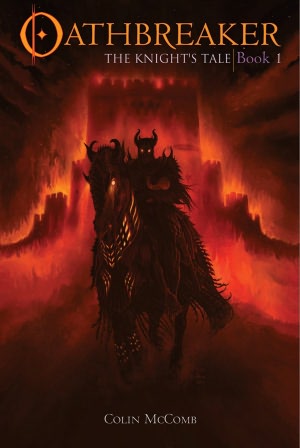 Oathbreaker, Book 1: The Knight's Tale by Colin McComb, is a riveting debut fantasy from an author who knows what fantasy fans love (he wrote adventures for TSR, after all) – visceral prose; logically sound and creative world-building; and fascinating characters that do not follow genre conventions.
Oathbreaker, Book 1: The Knight's Tale by Colin McComb, is a riveting debut fantasy from an author who knows what fantasy fans love (he wrote adventures for TSR, after all) – visceral prose; logically sound and creative world-building; and fascinating characters that do not follow genre conventions.Sir Pelagir, a Knight Elite in the Empire of Terona, faces a terrible choice – serve the Empire or serve the King. There is no middle ground. Either choice means he will break an oath and be hunted for the rest of his life. But a choice he makes, and it is one that makes him a marked man and sets the Empire on a destructive path from which it may never recover.
Right from the beginning, we know we're reading an author who knows what the heck he's doing. From the Prologue:
He rode, his proud face bleeding and grim in the light of the setting sun. He cradled a sleeping baby in the crook of his left arm, the reins of the metal horse in his right fist. With a few swift kicks, he urged the steed ever faster westward. His eyes squinted into the setting sun, and beads of perspiration—or were they tears?—coursed down his unlined cheeks. The gleaming hooves of the steed tore great clumps of sod from the grassy hills as it sped through the spring dusk.
Miles behind him, the city burned on its mountain. Steel-clad knights thundered from the great city’s gates into the dying day on their own metal stallions or took to the air with mechanical wings. The military dirigibles Retaliator and Heaven’s Will rose slowly from the heart of the city, flames spitting from their engines, and turned their massive noses to the west.
The knights sought the oathbreaker, the thief of their princess, the betrayer of their king. They swore bloody vengeance on Pelagir of the King’s Chosen, son of Pelgram, and raced to be the first to have his head. He had betrayed the most sacred of their oaths, and their rage burned as brightly as the flames in the capital city.
I dare any fantasy fan to stop reading at this point. I mean, the whole book is like this. And don't worry, McComb's prose serves the story, and not the other way around like so many first-time authors. Not a word is wasted.
The dialogue is unique to each character – you'd know who was speaking even without attribution. Some of the characters even tell their own tales in first person narration, giving the reader better insight into their goals and desires.
The settings are not overly described, but given one or two descriptive elements that lock them firmly into your mind, enabling your imagination to fill in the rest. While Oathbreaker was a short book – around 40,000 words – I did not feel like it was a “thin” book. McComb gave me a thorough introduction to his Empire of Terona, yet left enough mystery for me to look forward to the next book.
The only nitpick I had was that the ending felt more like the end of the first act rather than the climax of a complete story. I know, this is only Book 1 and, yes, that Tolkien fellow did the same thing, but it's never been one of my favorite novel structures. Plus, I had to find some nit to pick in this otherwise spectacular fantasy novel. My credibility as a reviewer demanded it. :-)
Highly recommended.
Originally posted at Quarkfolio by Rob Steiner.
No comments:
Post a Comment